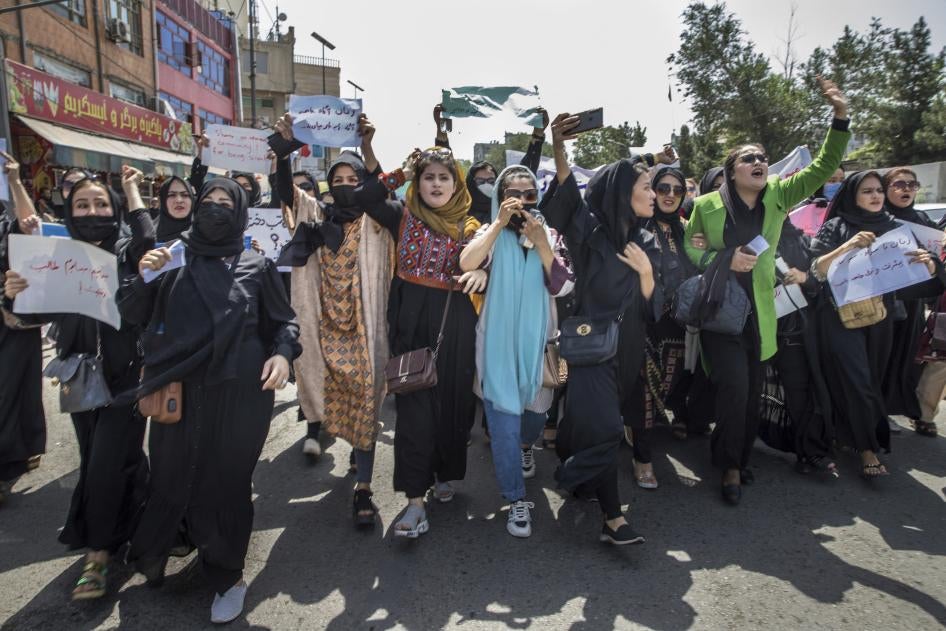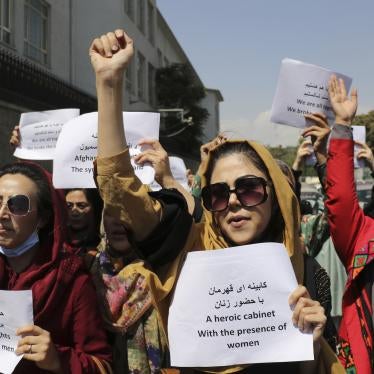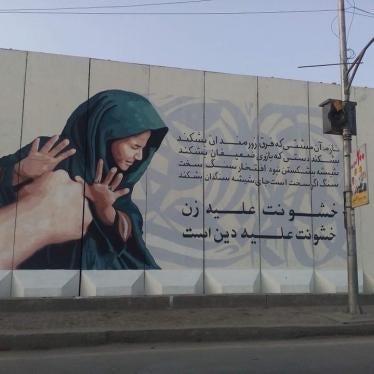In the last two and a half years after regaining power in Afghanistan, the Taliban, have created the world’s most serious women’s rights crisis. They have systematically violated the rights of women and girls including as they relate to education, paid employment, freedom of speech and movement, and political participation among many others. The response of the international community has been tepid and seems to lack an appreciation of how the situation in Afghanistan has grave implications for the rights of women and girls globally. More needs to be done to prevent this from developing any further and to reinforce global commitment to gender equality.
The crisis in Afghanistan has largely disappeared from the news. It was pushed aside by the war in Ukraine and the humiliation and fatigue of Western countries whose twenty years of military and civilian intervention ended in dust and defeat. As a new war unfolds in the Middle East, Afghans do not have the option to just move on and forget—for women and girls in particular, life under the Taliban involves ever-deepening misery.
In the more than two years since seizing control of Afghanistan in August 2021, the Taliban have carried out a relentless and all-encompassing attack on the human rights of women and girls, violating virtually every aspect of these rights.
Afghan women are putting their lives on the line—facing surveillance, harassment, assault, arbitrary detention, torture, and exile—to oppose Taliban abuses. They deserve the international community’s full solidarity in their struggle. But the world should also stand with them because the events in Afghanistan—and the world’s response—have deep implications for gender equality everywhere.
At A Glance: “Gender Apartheid” in the Taliban’s Afghanistan
There is broad consensus that the situation in Afghanistan is the most serious women’s rights crisis in the world. The country is ranked last on the Women, Peace and Security Index and the UN Special Rapporteur on the human rights situation in Afghanistan has referred to “the unprecedented deterioration of women’s rights.” Afghan women—and officials at the UN and elsewhere—have called it “gender apartheid.” Since the adoption of the Universal Declaration of Human Rights 75 years ago, there may never have been anything like it—except once, from 1996 to 2001 when the Taliban previously controlled Afghanistan.
Recent Taliban crackdowns on women’s employment in the private sector, including ordering the closure of all beauty salons at a cost of 60,000 women’s jobs, signal a continuing assault on the livelihood of Afghan women. The closure of beauty salons also signifies the loss of one of the very few women-only spaces outside the home—a crucial source of community and support, especially given that the Taliban systematically dismantled services for women and girls experiencing domestic violence.
Their ban on women working in most roles in aid agencies is putting more women and girls in crisis. In Afghanistan’s increasingly gender-segregated society, if women workers are not there to deliver aid to women, they will often go without aid. Beyond blocking basic access to food at risk, even the chance to walk in a park, play a sport, or enjoy nature is being stripped away from Afghanistan’s women and girls.
Women who protest these violations face terrible consequences including enforced disappearance, arbitrary detention, and torture. From threats, beatings, and abusive conditions both during detainment and release, the Taliban continue to commit severe abuses against an ongoing—and underreported—string of women’s rights defenders. More recently they have also begun widespread detaining of women and girls on accusations that they were not wearing “proper hijab.”
Afghanistan today faces a constant flow of new restrictions against women and girls—and the Taliban are nowhere near done with their dystopian project.
Un-Feminist Foreign Policy
Human Rights Watch, Amnesty International, the International Commission of Jurists, and Madre have all adopted the position that the Taliban have committed crimes against humanity of gender persecution, which fall within the jurisdiction of national and international courts including the International Criminal Court (ICC).
The response of governments and international organizations to this crisis, though, has been poor. It has been disorganized, politicized, chaotic, often apathetic, and, frankly, un-feminist. Many diplomats tell us how important it is to “engage” with the Taliban. But it is very clear by now that that engagement has produced nothing in terms of convincing the Taliban to end their assault on women’s rights—and may even be counterproductive. When diplomats “engage,” the focus is often on counter-terrorism, counter-narcotics, business deals, or hostage returns. Despite Afghan women signaling and appealing otherwise, their rights protection agenda rarely makes it onto the priority list of diplomats.
There has also been unhelpful global rhetoric suggesting that the international community faces a mutually exclusive choice between defending women’s rights and saving lives through humanitarian assistance – many prioritizing the latter only. However, fully respecting women’s rights is essential to the project of saving lives through humanitarian assistance.
The fact that over 90 percent of the more than 2,000 people killed in the October 2023 Herat earthquakes were women and children is a stark reminder of this. The earthquake struck in late morning, at an hour when men were out at work and women were at home minding children—the only role the Taliban feel they ought to have. Rights violations under the Taliban have also contributed to higher rates of hunger among women-headed households – another indicator of why more needs to be done.
If the world can learn to live with the Taliban’s abuses—Afghan women being largely confined to their homes, losing their voice, their personhood, their education, their dreams, and contributions to their communities—then this is a brutal demonstration of how fragile the rights of women and girls are everywhere.
If Taliban leaders can fly on private jets, be rolled the red carpet on diplomatic visits, allowed to run embassies, and be courted for business deals—while continuing to enact the most comprehensive set of women’s rights violations on the planet—this is a clear sign of how little women’s rights, anywhere, matter.
Consequences Far Beyond Afghanistan
Beyond Afghanistan, communities face a global backlash and repressive developments against the rights of women and girls. From attacks on reproductive rights and sexual violence against women and girls during conflicts, to the gendered impacts of climate change, women’s rights all over the world remain in crisis.
No country has achieved gender equality. Women in Iceland, long seen as the world’s most equal country, recently went on strike, protesting stalled progress toward gender equality. In Iran, women and their male allies have been jailed and killed for protesting forced hijab-wearing and other forms of discrimination. Women’s participation in peace processes is decreasing, even in UN-supported talks.
Technological advances are fueling new forms of gender-based violence including against female journalists and politicians with serious and even deadly consequences. UN Women says gender disparities are worsening and it could take another 286 years to close the global gender gaps in legal protections for women and girls. In countries with declining birth rates, governments are often pursuing strategies that harm women.
The Taliban’s attacks on the rights of women and girls in Afghanistan—and the tepid international response to this crisis—are happening within this context. The global backlash perhaps feels like permission for diplomats to shrug their shoulders in a “what can you do?” way over the women’s rights crisis in Afghanistan. One effect of the Taliban’s abuses is that the bar for women’s rights globally just got much lower. The lack of an effective international response creates the impression that women’s rights are not much of a concern to world leaders.
Experts and activists in other countries have pointed to “Talibanization,” where the success of the Taliban appears to be emboldening misogynistic leaders everywhere. In Yemen, for instance, Houthi leaders have imposed similar restrictions. Boko Haram is sometimes referred to as the Taliban of Nigeria and elsewhere the Taliban have been described as “the world’s most successful terrorist group.”
A Way Forward?
So, what should the international community do to stand with Afghan women and, in doing so, defend women’s rights everywhere? Rights advocates must tell political leaders that they have not forgotten the women’s crisis in Afghanistan, and leaders are not allowed to either. Specific steps within multilateral organizations must be taken.
At the United Nations (UN) level, leaders should support efforts to adopt a treaty on crimes against humanity that would strengthen protections for women and explore the inclusion of “gender apartheid.” There is also a need for the creation of a UN-mandated accountability mechanism to collect and preserve evidence of international crimes being committed in Afghanistan, including against women and girls. Delegates should support the special rapporteur and other experts on human rights in Afghanistan as they prepare to report to the Human Rights Council in June 2024 on a response to the Taliban’s “institutionalized system of discrimination, segregation, disrespect for human dignity and exclusion of women and girls.”
Finally, discussions should call for the renewal of the mandate of the United Nations Assistance Mission in Afghanistan while maintaining its current responsibility to monitor the human rights situation with adequate staffing.
As for international courts, political leaders should ensure that the ICC and other courts have the resources and cooperation needed to hold Taliban leaders accountable for gender persecution. A case must also be brought to the International Court of Justice regarding the Taliban’s violations of the Convention on the Elimination of All Forms of Discrimination against Women, which Afghanistan ratified without reservation in 2003.
As a well-known saying from Indigenous women activists in Australia goes, “If you have come to help me, you are wasting your time. If you have come because your liberation is bound up with mine, then let us walk together.” The international community should recognize that the fight Afghan women and girls are in right now is a fight for the rights of women and girls everywhere. We should stand with them as if their fate helps determine our own—because it does.









